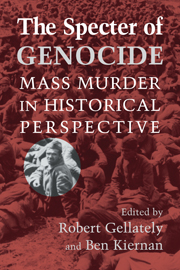Book contents
- Frontmatter
- Contents
- List of Contributors
- Acknowledgments
- INTRODUCTION
- PART I GENOCIDE AND MODERNITY
- PART II INDIGENOUS PEOPLES AND COLONIAL ISSUES
- PART III THE ERA OF THE TWO WORLD WARS
- 9 Under Cover of War
- 10 The Mechanism of a Mass Crime
- 11 The Third Reich, the Holocaust, and Visions of Serial Genocide
- 12 Reflections on Modern Japanese History in the Context of the Concept of Genocide
- PART IV GENOCIDE AND MASS MURDER SINCE 1945
- CONCLUSIONS
- Appendix: Convention on the Prevention and Punishment of the Crime of Genocide
- Index
10 - The Mechanism of a Mass Crime
The Great Terror in the Soviet Union, 1937–1938
Published online by Cambridge University Press: 05 June 2012
- Frontmatter
- Contents
- List of Contributors
- Acknowledgments
- INTRODUCTION
- PART I GENOCIDE AND MODERNITY
- PART II INDIGENOUS PEOPLES AND COLONIAL ISSUES
- PART III THE ERA OF THE TWO WORLD WARS
- 9 Under Cover of War
- 10 The Mechanism of a Mass Crime
- 11 The Third Reich, the Holocaust, and Visions of Serial Genocide
- 12 Reflections on Modern Japanese History in the Context of the Concept of Genocide
- PART IV GENOCIDE AND MASS MURDER SINCE 1945
- CONCLUSIONS
- Appendix: Convention on the Prevention and Punishment of the Crime of Genocide
- Index
Summary
In the past few years, the access, though limited, to previously inaccessible documents from the Politburo of the Communist Party of the Soviet Union (CPSU) and the State Security Police has thrown new light on the mechanism, the organization, and the implementation of the “Great Terror.” This crucial episode of Stalinism had provoked, long before the opening of the Soviet archives, a number of studies and debates about the amplitude, the reasons, and the purpose of the massacre of tens of thousands of communist officials and of a huge number (the evaluations ranged between hundreds of thousands and several millions) of ordinary soviet citizens – a massacre perpetrated by “a state against its people.” In the 1950s American scholars proposed a structural explanation of the Great Terror: as a totalitarian system Stalin's regime had to maintain its citizens in a state of fear and uncertainty, and recurrent random purging provided the mechanism. At the end of the 1960s Robert Conquest published the first detailed account, which was to become a classical reference, of the Great Terror. Based primarily on testimonies or memoirs of those who had survived or deserted the “Fatherland of socialism” and on the numerous Soviet publications in the years of the “Khruschev thaw,” the work of Robert Conquest emphasized Stalin's paranoia, focused on the Moscow show trials of old Bolsheviks, and analyzed the carefully planned and systematic destruction of the Leninist party leadership as the first step toward terrorizing the entire population.
- Type
- Chapter
- Information
- The Specter of GenocideMass Murder in Historical Perspective, pp. 215 - 240Publisher: Cambridge University PressPrint publication year: 2003
- 2
- Cited by



